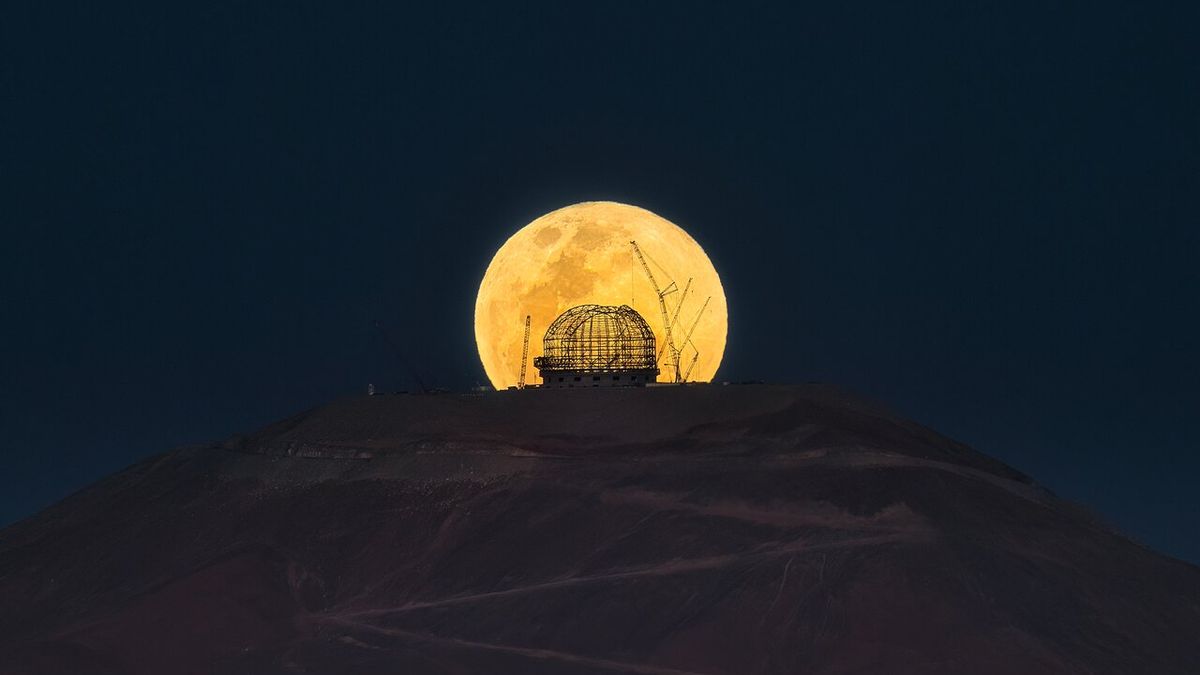The steel skeleton of the world’s largest visible- and infrared-light telescope is illuminated by the rising full moon in a new photo from the European Southern Observatory (ESO).
Construction of ESO’s Extremely Large Telescope (ELT) is underway on Cerro Armazones in Chile’s Atacama Desert, with the monster telescope expected to see its “first light” by 2028. ESO recently shared a spooky new photo of the telescope’s progress in honor of Halloween.
“In this image –– a throwback to a famous scene in [the 1982 movie] ‘E.T.’ –– we see the steel skeleton of the telescope dome eerily illuminated under the moonlight,” ESO officials said in a statement. “It now stands at a towering 80 meters [262 feet] high; when completed, the whole structure will rotate 360 degrees to observe the night sky, all while weighing 6,100 tonnes — about as heavy as 1,500,000 pumpkins.”
Related: Scientists bury time capsule to celebrate upcoming Extremely Large Telescope (photos)
At 120 feet (39.3 m) wide, the ELT will be the largest telescope in the world for visible and infrared light. (There are larger radio telescopes out there.) It will house five separate mirrors, the largest of which will be made up of 798 individual hexagonal segments.
In the recent ESO photo, the moon appears ginormous behind the telescope dome perched high up on Cerro Armazones, a mountain that’s 9,993 (3,046 m) tall. This is the result of an optical effect called the moon illusion, which causes the moon to appear larger near the horizon than it does higher up in the sky.
The photo was taken on Oct. 28, the same day that millions of people in Europe, Africa, Asia and parts of Australia enjoyed a lunar eclipse. ESO officials took the photo from about 12 miles (20 kilometers) away — close to the entrance of the Paranal Observatory, which is home to ESO’s Very Large Telescope (VLT).
“It’s not every day that the moon is positioned so perfectly behind the mountaintop, so an event was carefully planned by the Paranal Photo Club to capture the moment,” ESO officials said in the statement. “Not only does the moon cycle through different phases — new moon, first quarter, full moon and last quarter — as it orbits around Earth every 27.3 days, but its position on the horizon and the time at which it rises change over time as well.”
That’s why the ESO team had to plan the photo op just right. In the new image, which was released on Oct. 30, the moon is rising in the night sky, with just a sliver still tucked beneath the Cerro Armazones mountain. The telescope dome and construction cranes appear dwarfed by the bright, golden full moon.
While the moon appears extremely large in the new photo, it’s really just an optical illusion: the moon is playing a trick (or treat) on our mind, otherwise known as the moon illusion. Viewers experience this when looking at the moon while it is setting or rising compared to when it is higher up in the sky. However, the moon never actually changes in size; it’s just a shift in our perception of how far away the moon really is and how big we expect it to be at that distance.

Dr. Thomas Hughes is a UK-based scientist and science communicator who makes complex topics accessible to readers. His articles explore breakthroughs in various scientific disciplines, from space exploration to cutting-edge research.








